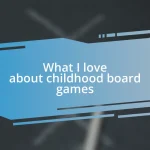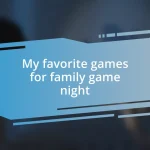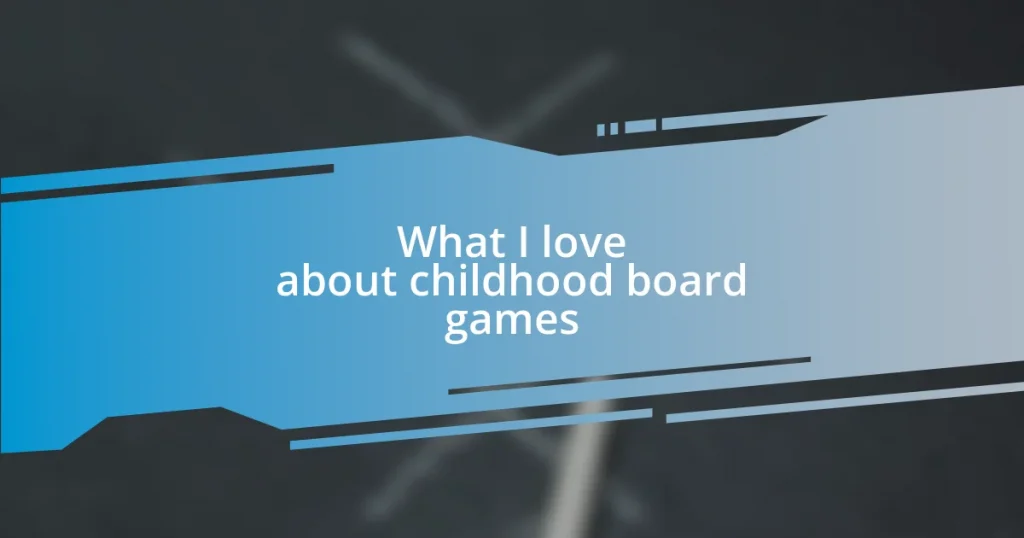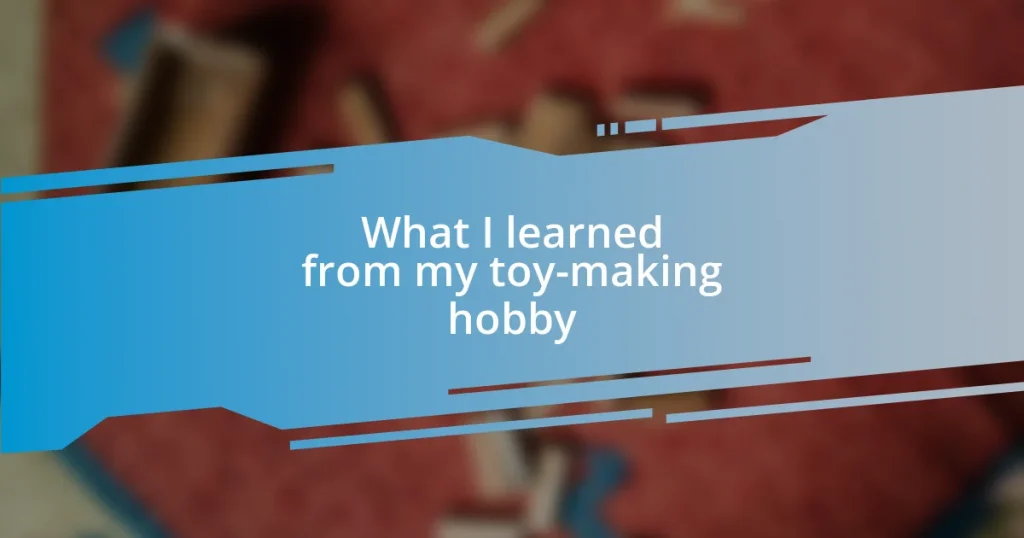Key takeaways:
- Childhood board games foster essential skills like social interaction, critical thinking, and patience, helping develop resilience and teamwork.
- Playing board games creates cherished memories and strengthens relationships through shared experiences and friendly competition.
- Nostalgic design elements and sensory experiences associated with board games enhance emotional connections and evoke fond childhood memories.
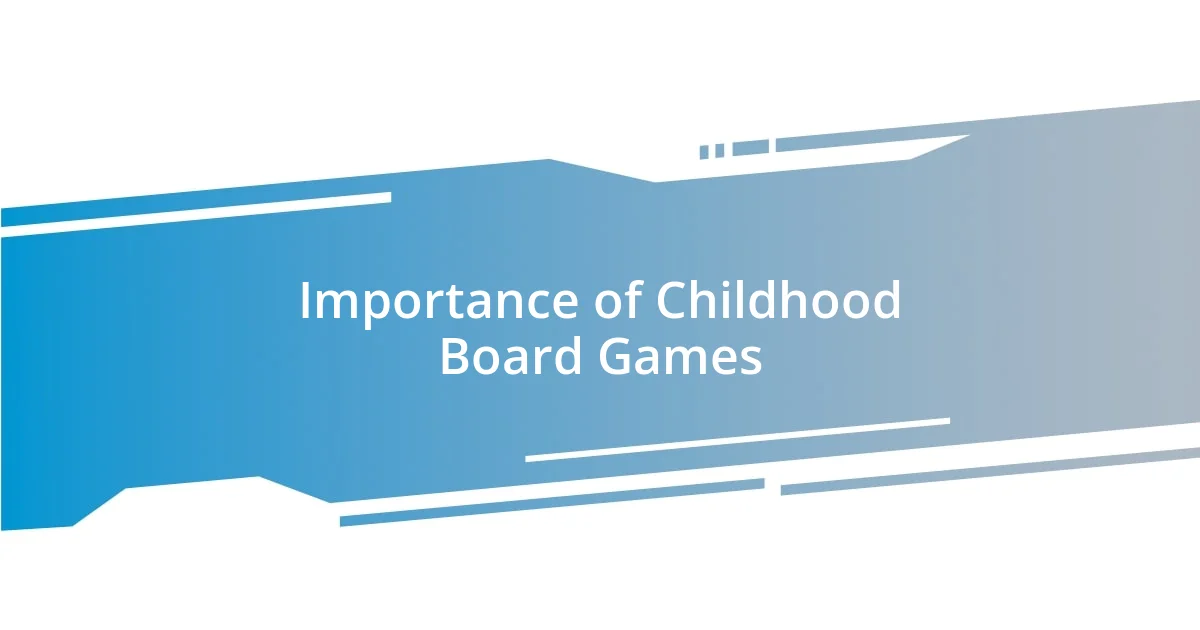
Importance of Childhood Board Games
Childhood board games are more than just entertainment; they serve as a vital tool for developing social skills. I can remember countless evenings spent around the kitchen table, laughing and strategizing with friends and family. Those moments taught me how to share, negotiate, and even deal with disappointment—a skill that has helped me throughout life.
Think about it: where else do kids learn the nuances of competition? I recall the thrill of rolling the dice in Monopoly, the anticipation of what properties I’d land on, and the inevitable disagreements over rules that ensued. These experiences not only taught me about winning and losing but also fostered resilience as we navigated those arguments and learned to shake hands afterwards.
Moreover, board games spark creativity and imagination in ways that digital games often don’t. I remember diving into the fantastical worlds of games like Dungeons & Dragons, crafting stories with friends that felt so real. Isn’t it fascinating how a simple game can transport us into a realm of possibility, all while cultivating teamwork and collaborative storytelling?
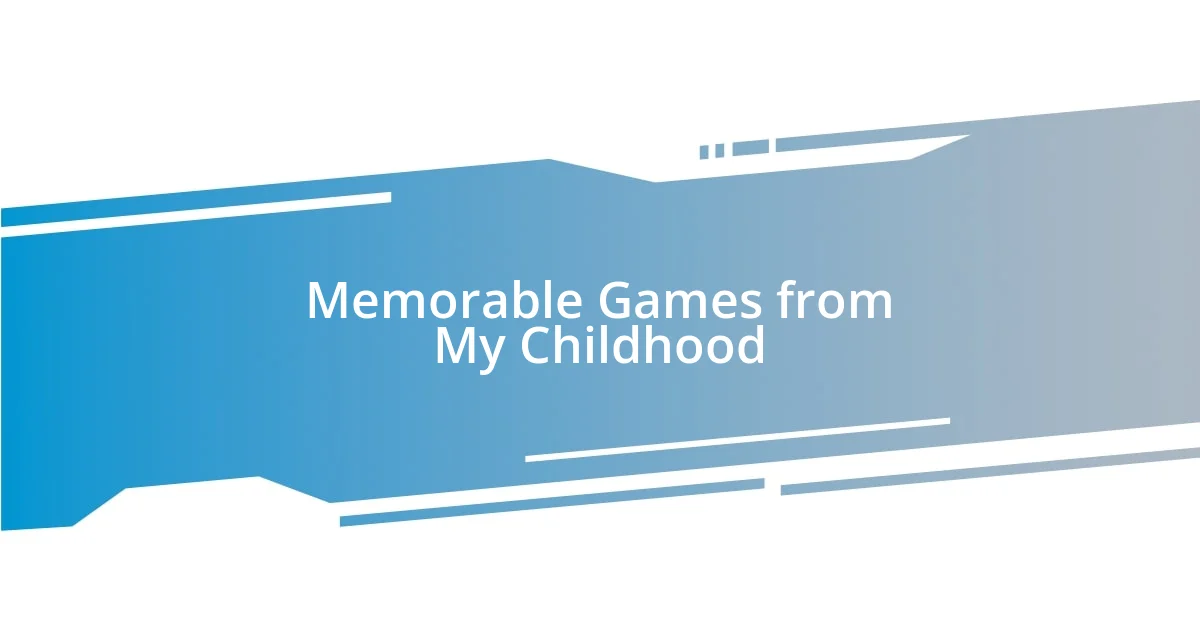
Memorable Games from My Childhood
I fondly reminisce about a game that ruled my childhood: Sorry! It was the ultimate blend of strategy and chance, which made every game an adventure of its own. My siblings and I would often dive into it after dinner, the living room echoing with our playful banter as we tried to outsmart one another by sending each other back to start. The excitement of drawing that perfect card felt like a little victory, and the inevitable sabotage brought up fits of laughter and playful grumbles.
A few other standout games always come to mind:
– Candy Land: The colorful board and sweet theme made it magical, especially for my younger self.
– Clue: I loved the mystery behind it, trying to solve the whodunit with my friends.
– Battleship: The thrill of calling out coordinates was unmatched; I can still hear my sister’s groans when she would inevitably miss my ships.
– Scrabble: The family rivalry over who could create the highest-scoring word always led to engaging debates and clever wordplay.

Skills Developed Through Board Games
Playing board games has always been a delightful way to enhance various skills. One of the most significant abilities developed through these games is critical thinking. I vividly remember intense games of chess where each move required strategic foresight. Analyzing my opponent’s intentions while planning my own moves sharpened my problem-solving skills, making me more effective in decision-making throughout my life.
Equally important is the boost to social skills. I often think back to family game nights filled with laughter and friendly jabs as we played games like Pictionary. Those moments were not just about having fun; they taught us to communicate visually and verbally, fostering a sense of collaboration. Each turn reinforced the importance of teamwork and empathy—what an invaluable lesson!
And then there’s the patience learned through board gaming. Trust me, nothing tested my patience more than waiting for my turn in a nail-biting game of Risk. The anticipation and the ability to handle delayed gratification have proven beneficial, particularly in today’s fast-paced world, where patience is often put to the test.
| Skill Developed | Board Game Example |
|---|---|
| Critical Thinking | Chess |
| Social Skills | Pictionary |
| Patience | Risk |

Social Benefits of Playing Together
Playing board games together has a magical way of bringing people closer. I remember a particular night when my friends and I gathered for a marathon session of Monopoly. Between the friendly debates over property trading and the laughter that erupted with each unfortunate landing on Boardwalk, I could see how easily we bonded. Who would’ve thought that rolling dice could pave the way for strengthening friendships and creating unforgettable memories?
Another vivid memory comes to mind: family game nights filled with competitive spirit, like when we played Uno. The tension would rise with each draw and the cheers of “Uno!” were music to our ears. This wasn’t just about winning; it was about sharing those intangible moments of joy and camaraderie. Each game created a shared narrative, elevating our interpersonal connections and teaching us the essence of sportsmanship.
Have you ever noticed how playing a game can foster deep conversations? I recall evenings spent playing Scrabble with my grandparents, where every word sparked stories from their past. This not only enhanced my vocabulary but also opened up channels of communication, blending nostalgia with learning. These shared experiences in a game setting turn into lessons in empathy and understanding, making the social benefits profound and lasting.

Nostalgic Elements of Game Design
There’s something to be said for the design elements that tug at our hearts. I think back to the vibrant colors and whimsical illustrations on game boxes like Candy Land. These visuals were not just eye-catching; they transported me to a fantastical world every time I opened the box. Doesn’t it make you smile when you see that familiar art? It’s like a warm hug from childhood.
The tactile experience of rolling dice or moving wooden pieces also brings back waves of nostalgia. I remember the satisfying clatter of dice on the table during a game of Catan. Each roll was an anticipation-filled moment, where luck and strategy collided. Isn’t it fascinating how those small physical interactions can evoke such strong feelings of joy and excitement?
Then there’s the music and sounds associated with games, which I believe play a subtle yet powerful role in their allure. I often hear the victorious “Ding!” from a game of Chutes and Ladders in my mind, a sound that still sparks an adrenaline rush. Those auditory cues don’t just signal a turn; they remind us of the laughter, competition, and sometimes, the friendly banter. Doesn’t remembering those sounds bring back a flood of cherished memories?
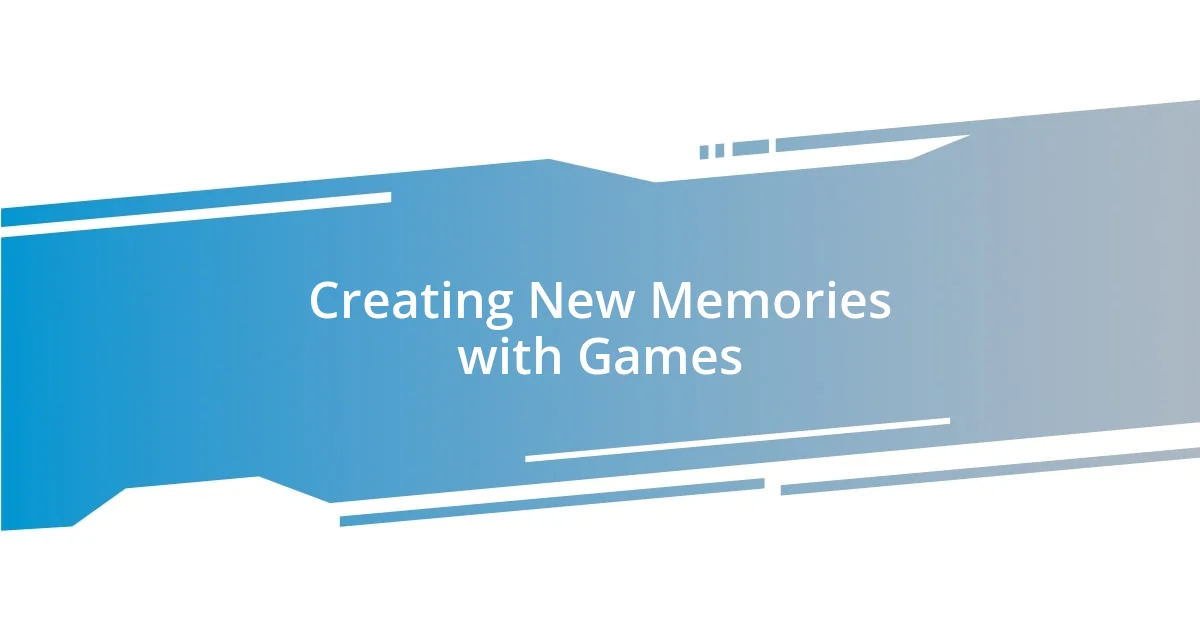
Creating New Memories with Games
Whether it’s a casual afternoon with family or a raucous game night with friends, I find that each playthrough unfolds a unique, shared story. Just last month, my buddies and I dusted off an old favorite, Clue. As we pieced together the mystery, I couldn’t help but recall the many times we’d argued over who the culprit was. It felt nostalgic yet fresh, as laughter mingled with lively debates about motives and alibis, reviving our long-standing friendships.
During one cozy winter evening, we dove into a game of Pictionary, and something magical happened. Each sketch—even the hilarious mismatches—sparked bursts of laughter and sparked outrageous guesses. For me, it was more than just a game; it was about feeling connected and alive in those moments. Doesn’t it make you think about how creativity can intertwine with camaraderie? Each laugh seemed to forge new memories, layering our friendship with even more cherished experiences.
Then there’s that feeling when a game becomes a new tradition. I remember starting a yearly family tournament of Jenga, complete with trophies and silly prizes. The thrill of pulling blocks while everyone holds their breath is thrilling! Each year, as we gathered around that wobbly tower, we relived past victories and epic failures, crafting new stories that would be told for years to come. Isn’t it incredible how something as simple as a game can bind generations with laughter and love?




